Samin Riasat
Covering in Hamming and Grassmann Spaces: New Bounds and Reed--Solomon-Based Constructions
Dec 28, 2025Abstract:We study covering problems in Hamming and Grassmann spaces through a unified coding-theoretic and information-theoretic framework. Viewing covering as a form of quantization in general metric spaces, we introduce the notion of the average covering radius as a natural measure of average distortion, complementing the classical worst-case covering radius. By leveraging tools from one-shot rate-distortion theory, we derive explicit non-asymptotic random-coding bounds on the average covering radius in both spaces, which serve as fundamental performance benchmarks. On the construction side, we develop efficient puncturing-based covering algorithms for generalized Reed--Solomon (GRS) codes in the Hamming space and extend them to a new family of subspace codes, termed character-Reed--Solomon (CRS) codes, for Grassmannian quantization under the chordal distance. Our results reveal that, despite poor worst-case covering guarantees, these structured codes exhibit strong average covering performance. In particular, numerical results in the Hamming space demonstrate that RS-based constructions often outperform random codebooks in terms of average covering radius. In the one-dimensional Grassmann space, we numerically show that CRS codes over prime fields asymptotically achieve average covering radii within a constant factor of the random-coding bound in the high-rate regime. Together, these results provide new insights into the role of algebraic structure in covering problems and high-dimensional quantization.
Efficient Covering Using Reed--Solomon Codes
Feb 04, 2025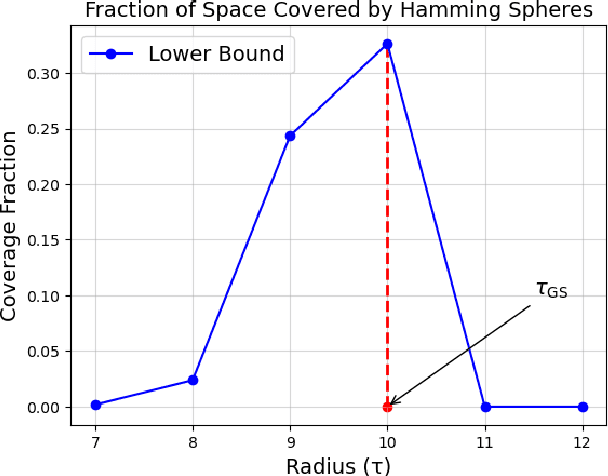
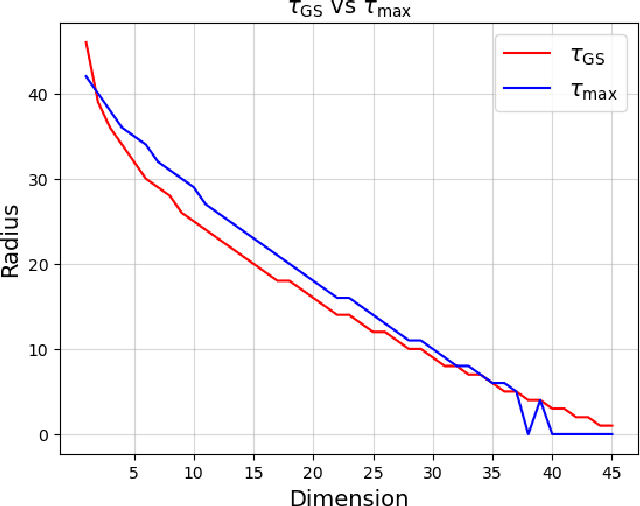
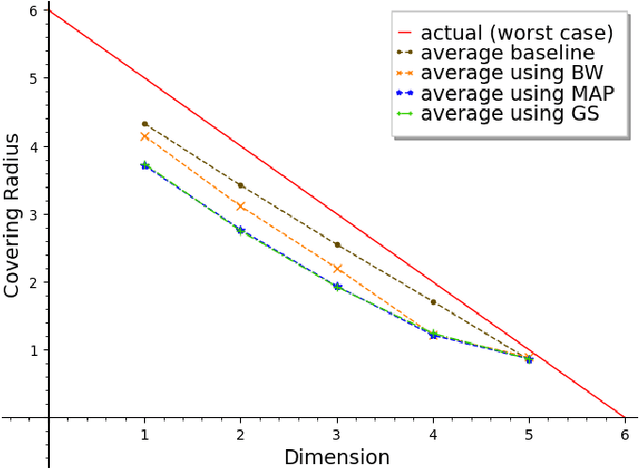
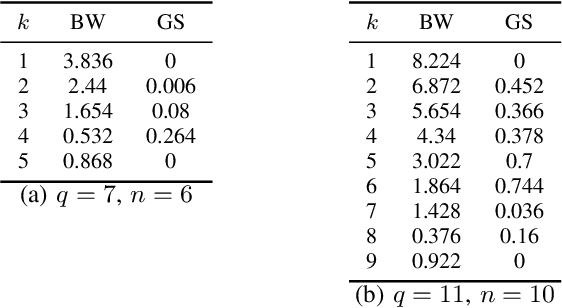
Abstract:We propose an efficient algorithm to find a Reed-Solomon (RS) codeword at a distance within the covering radius of the code from any point in its ambient Hamming space. To the best of the authors' knowledge, this is the first attempt of its kind to solve the covering problem for RS codes. The proposed algorithm leverages off-the-shelf decoding methods for RS codes, including the Berlekamp-Welch algorithm for unique decoding and the Guruswami-Sudan algorithm for list decoding. We also present theoretical and numerical results on the capabilities of the proposed algorithm and, in particular, the average covering radius resulting from it. Our numerical results suggest that the overlapping Hamming spheres of radius close to the Guruswami-Sudan decoding radius centered at the codewords cover most of the ambient Hamming space.
Precoding Design for Limited-Feedback MISO Systems via Character-Polynomial Codes
Jan 10, 2025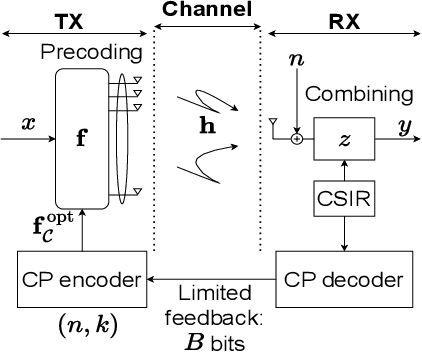
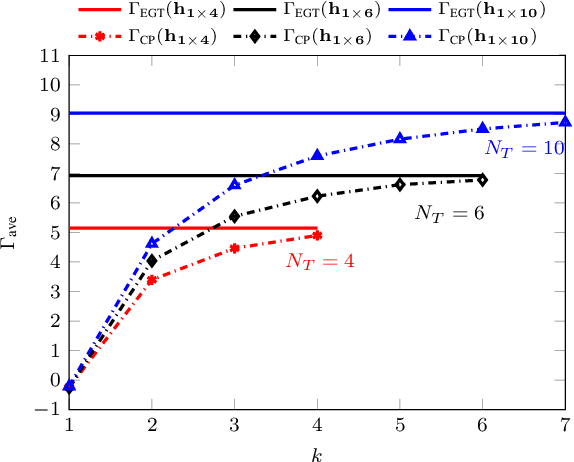
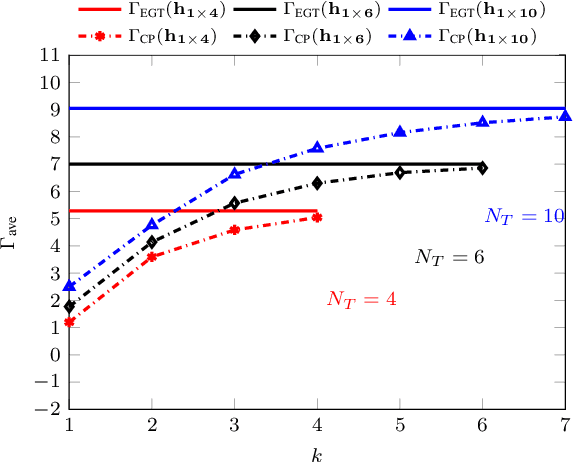

Abstract:We consider the problem of Multiple-Input Single- Output (MISO) communication with limited feedback, where the transmitter relies on a limited number of bits associated with the channel state information (CSI), available at the receiver (CSIR) but not at the transmitter (no CSIT), sent via the feedback link. We demonstrate how character-polynomial (CP) codes, a class of analog subspace codes (also, referred to as Grassmann codes) can be used for the corresponding quantization problem in the Grassmann space. The proposed CP codebook-based precoding design allows for a smooth trade-off between the number of feedback bits and the beamforming gain, by simply adjusting the rate of the underlying CP code. We present a theoretical upper bound on the mean squared quantization error of the CP codebook, and utilize it to upper bound the resulting distortion as the normalized gap between the CP codebook beamforming gain and the baseline equal gain transmission (EGT) with perfect CSIT. We further show that the distortion vanishes asymptotically. The results are also confirmed via simulations for different types of fading models in the MISO system and various parameters.
Decoding Analog Subspace Codes: Algorithms for Character-Polynomial Codes
Jul 04, 2024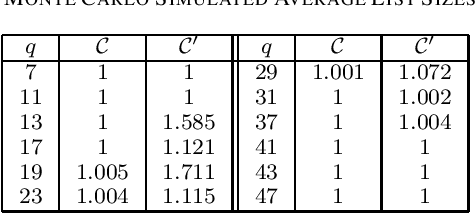
Abstract:We propose efficient minimum-distance decoding and list-decoding algorithms for a certain class of analog subspace codes, referred to as character-polynomial (CP) codes, recently introduced by Soleymani and the second author. In particular, a CP code without its character can be viewed as a subcode of a Reed--Solomon (RS) code, where a certain subset of the coefficients of the message polynomial is set to zeros. We then demonstrate how classical decoding methods, including list decoders, for RS codes can be leveraged for decoding CP codes. For instance, it is shown that, in almost all cases, the list decoder behaves as a unique decoder. We also present a probabilistic analysis of the improvements in list decoding of CP codes when leveraging their certain structure as subcodes of RS codes.
 Add to Chrome
Add to Chrome Add to Firefox
Add to Firefox Add to Edge
Add to Edge